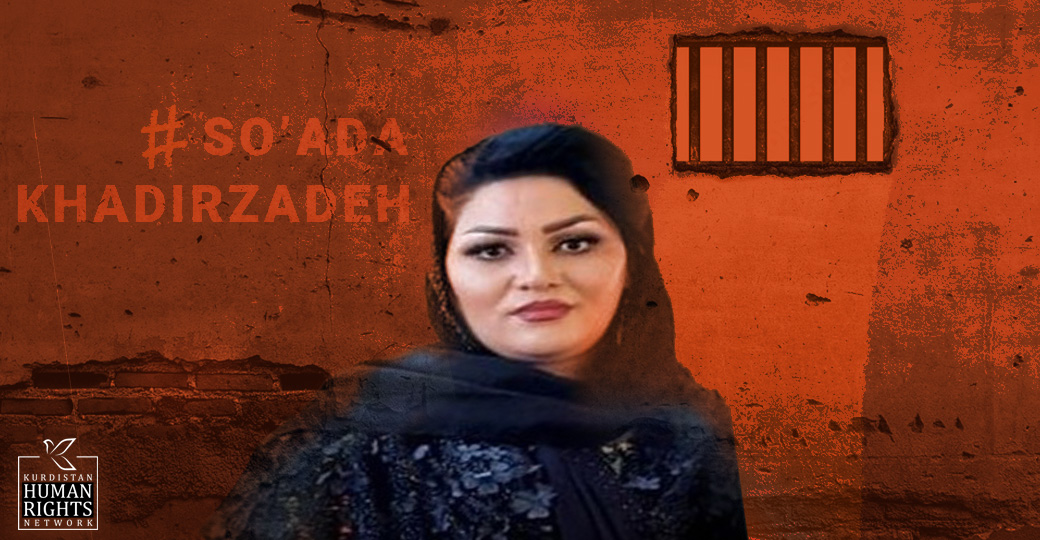On 5 October 2021, Khedr (Khezr) Piroutinia, a member of the Islamic Revolutionary Guard Corps (IRGC), was killed by gunfire from unknown assailants on a street in Piranshahr, West Azerbaijan Province. A group known as the “Eagles of Zagros” claimed responsibility for his killing.
The family of the IRGC member accused So’ada Khadirzadeh’s husband, who had fled the country, of being one of the perpetrators of the murder. Consequently, security forces arrested Khadirzadeh instead of her husband.
Arrest
Khadirzadeh was arrested by security forces in Piranshahr on 14 October 2021 and transferred to a security detention centre in Orumiyeh, West Azerbaijan Province. After 12 days, she was moved to Orumiyeh Central Prison.
Judicial Process
After about 11 months of detention, on 24 August 2022, Khadirzadeh’s trial was held online in Branch Three of the Criminal Court One in Mahabad, West Azerbaijan Province, presided over by Judge Javad Banaei and the court advisors Amir Ojaghlou and Gholam Karimkhani.
She was tried on charges of “complicity in the murder” of IRGC member Khedr Peyroutinia, “aiding a fugitive”, and sentenced to 12 years and six months of imprisonment. She was informed of the verdict on 6 September 2022.
She was also sentenced to four years of imprisonment by the Islamic Revolutionary Court of Piranshahr on charges of “acting against national security” through membership of the Democratic Party of Iranian Kurdistan (PDKI).
In February 2024, the Supreme Court overturned her 12 years and six months imprisonment sentence for “complicity in murder”.
Additionally, under pressure from security forces, another case was filed against her in the Islamic Revolutionary Court of Miandoab, West Azerbaijan Province, on charges of “aiding in the purchase of weapons”.
Current Status
Khadirzadeh, along with her young child, is being held in the women’s ward of Orumiyeh Central Prison.
Since her arrest, she has been denied conditional release and furlough due to opposition from security forces.
Additional Information
– On 26 April 2022, in protest against her ongoing uncertainty, she went on a hunger and medication strike in the women’s ward of Orumiyeh Central Prison. She ended her strike after 12 days following assurances from prison officials that she would be temporarily released on bail.
– On 20 June 2022, she was transferred to a medical centre in Orumiyeh for a caesarean section and returned to prison the next day after giving birth.
– In July 2022, Amnesty International issued a statement stating that Khadirzadeh had not been allowed access to a lawyer since her arrest. Amnesty said: “Her detention is contrary to the standards of a fair trial and is considered arbitrary under international law because she has been detained for a long time without knowing the reasons for her detention and has been denied access to a lawyer.”
– On 18 August 2022, Khadirzadeh attempted to commit suicide by hanging herself due to the ongoing uncertainty regarding her case and pressure of the security agencies.
– Following the widespread circulation of the news of her suicide attempt, Mohammad Farahani, the editor-in-chief of the Mizan news agency, affiliated with the judiciary, denied the news on his X account, saying: “So’ada Khadirzadeh not only did not commit suicide, but last week, the head of the West Azerbaijan judiciary talked to her in prison. Her detention order has been converted to bail, and she can be released upon providing the bail.” However, contrary to this claim, the Mahabad judiciary officials opposed her temporary release on bail. Additionally, Mizan news agency, affiliated with the judiciary, released a video of forced confessions from Khadirzadeh, denying her suicide attempt.
Notes:
1. The Eagles of Zagros is an armed and covert group in Kurdistan, primarily focused on targeting the military forces of the Islamic Revolutionary Guard Corps (IRGC).
2. The Democratic Party of Iranian Kurdistan (PDKI) was founded on 16 August 1945, with the aim of gaining autonomy for Iranian Kurdistan. According to the party’s charter, this political organisation, grounded in the “nationalist ideas and organizational structure of the Society for Kurdish Resurrection (KJK) and with a realistic and contemporary approach”, emerged as a modern entity in the political arena. KJK was the founder of the Republic of Kurdistan (22 January 1946 – 15 December 1946) in Mahabad. The republic lasted only 11 months, ending with an attack by the Iranian army, which executed its leaders, including Qazi Muhammad, the party leader and President of Kurdistan.
PDKI went through a period of armed struggle in the late 1960s, marked by internal party disputes, and ultimately, re-emerged as a political party on the eve of the 1979 revolution. Two of its leaders, Abdul Rahman Ghassemlou and Sadegh Sharafkandi, were assassinated by the Islamic Republic of Iran in Europe in 1989 and 1992, respectively. In 2006, due to heightened internal conflicts, the party split into two factions: the Democratic Party of Iranian Kurdistan and the Kurdistan Democratic Party (HDK). These two factions eventually announced their reunification on 22 August 2022, after 15 years of separation.
The party has declared its ultimate goal as “the establishment of a democratic-socialist society” and its strategic slogan as “securing the rights of the Kurdish people in Iranian Kurdistan within the framework of a federal democratic system in Iran”. The main headquarters of the PDKI is in Erbil, Kurdistan Region of Iraq.

